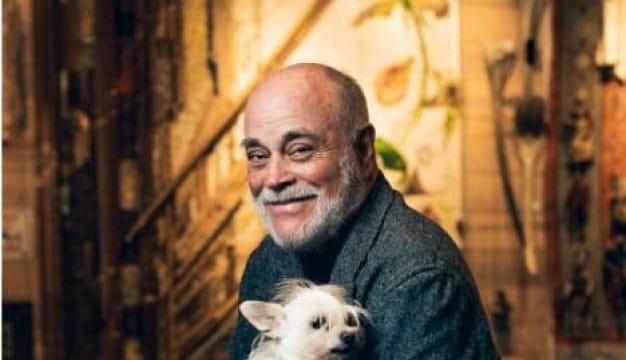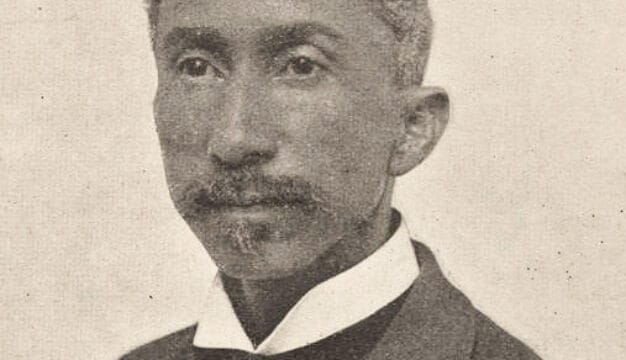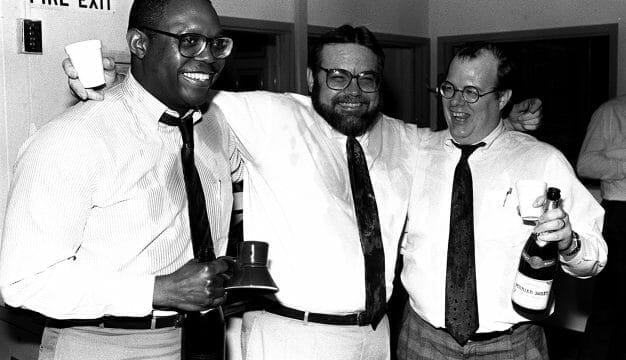Winton M. Blount Jr.
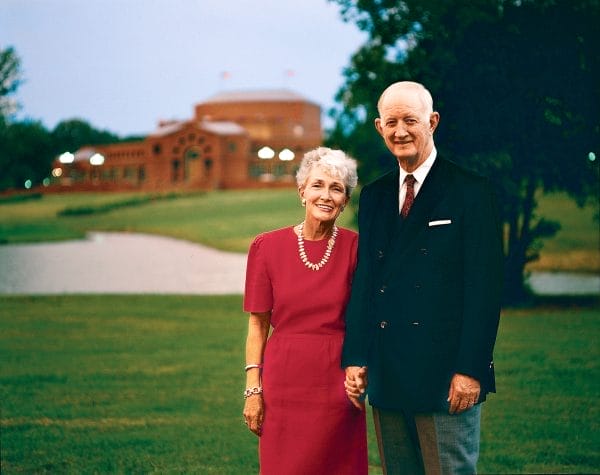 Carolyn and Winton Blount
Winton Malcolm “Red” Blount Jr. (1921-2002), a Montgomery business executive, was one of the most renowned philanthropists in the history of Alabama, funding the highly acclaimed Alabama Shakespeare Festival and many educational programs as well as donating large sums to the National Postal Museum in Washington, D.C. Blount was known as “the father of postal reform” for leading a major reorganization of the U.S. Postal Service while serving as Postmaster General of the United States from 1969 to 1971. In addition, he was active in the state Republican Party for 50 years and ran unsuccessfully for the U.S. Senate in 1972.
Carolyn and Winton Blount
Winton Malcolm “Red” Blount Jr. (1921-2002), a Montgomery business executive, was one of the most renowned philanthropists in the history of Alabama, funding the highly acclaimed Alabama Shakespeare Festival and many educational programs as well as donating large sums to the National Postal Museum in Washington, D.C. Blount was known as “the father of postal reform” for leading a major reorganization of the U.S. Postal Service while serving as Postmaster General of the United States from 1969 to 1971. In addition, he was active in the state Republican Party for 50 years and ran unsuccessfully for the U.S. Senate in 1972.
Blount (pronounced “blunt”) was born in Union Springs, Bullock County, and was the oldest of three children of Winton M. “Beau” Blount Sr. and Clara Belle Chalker Blount. (Blount’s first name was spelled with a “y” on his birth certificate, but he used Winton as an adult in his business dealings to avoid having to explain the unusual spelling.) The senior Blount owned a sand and gravel plant and a short-line railroad that ran 50 miles from Union Springs to Tallassee. Winton attended Union Springs High School, and after graduating in 1938, he attended Staunton Military Academy in Virginia for one year and then enrolled at the University of Alabama. He left the university after three semesters, preferring work to academics. He spent a year in his father’s business before enlisting in the Army Air Corps when the United States entered World War II in December 1941. He became a flight instructor during the war and attained the rank of first lieutenant. He was about to transfer overseas for combat duty as a bomber pilot when the war ended in 1945. In 1942, while in the military, he married his high-school sweetheart, Mary Katherine Archibald, with whom he had five children. The couple would divorce in 1981.
Blount and his younger brother, Houston, capitalized on the post-war construction boom by borrowing $28,000 to start Blount Brothers Construction Company in 1946. Houston left the company in 1948 to work at Vulcan Materials Company, eventually becoming its president. Blount Brothers (which later changed its name to Blount Inc. and then to Blount International Inc.) grew rapidly under Winton’s leadership. It began by building commercial fish ponds in Alabama, then moved to roads and bridges, and eventually to large structures such as the Superdome in New Orleans, a launch complex at Cape Canaveral in Florida, and the campus of King Saud University in Saudi Arabia. By 1979, its revenues exceeded $500 million a year.
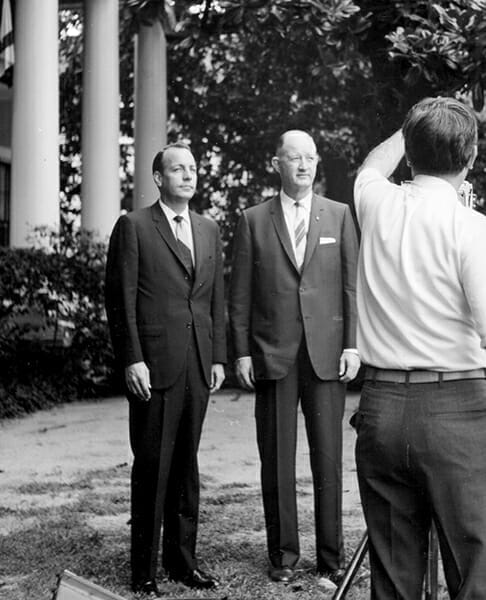 Winton M. Blount and Albert Brewer
As the company grew, Blount became active in community organizations, including the United Appeal and the YMCA. He also developed a passion for politics. Originally a Democrat, Blount switched to the Republican Party in 1952 because he admired Dwight Eisenhower, the Republican candidate for president. A self-described conservative, he continued to support Republican candidates and raise money for their campaigns for the rest of his life, helping to transform the Alabama Republican Party from a small group to the influential organization it is today.
Winton M. Blount and Albert Brewer
As the company grew, Blount became active in community organizations, including the United Appeal and the YMCA. He also developed a passion for politics. Originally a Democrat, Blount switched to the Republican Party in 1952 because he admired Dwight Eisenhower, the Republican candidate for president. A self-described conservative, he continued to support Republican candidates and raise money for their campaigns for the rest of his life, helping to transform the Alabama Republican Party from a small group to the influential organization it is today.
During the civil rights era, Blount was a voice for tolerance and calm when protests swept across the South. He did not favor the passage of federal civil rights legislation—believing that the South could resolve its racial issues on its own—but he urged Alabamians to obey federal civil rights laws after they were enacted. In 1963, when Gov. George Wallace threatened to defy a federal court order and prevent two black students from enrolling at the University of Alabama, Blount—who was by then a member of the university’s board of trustees—intervened by contacting U.S. Attorney General Robert F. Kennedy and working out a compromise. Wallace was permitted to stand in the doorway of the registrar’s office and make a statement but then stepped aside and allowed the students to enroll, averting a confrontation with federal troops, who were on campus to enforce the court order.
In 1969, Blount took a leave of absence from his company to join Pres. Richard Nixon’s cabinet as Postmaster General of the United States. For decades, local postmasters and rural letter carriers had been appointed by politicians. Blount helped create today’s independent U.S. Postal Service, in which jobs and promotions are based on merit. He resigned as Postmaster General at the end of 1971 to run for the U.S. Senate. He defeated former U.S. representative James D. Martin in the 1972 Republican primary but lost badly to incumbent Democrat John Sparkman and did not run again for elective office.
Blount returned to his company in 1973 and eventually refocused it, selling the construction business and expanding into industrial manufacturing. By the 1970s, the business had made Blount wealthy, and he began to give away much of that wealth. Gaining an interest in the arts, he became a leading advocate for government funding of museums, theater groups, and other arts organizations. His company assembled a major collection of American paintings, including works by Edward Hopper, Stuart Davis, and John Singer Sargent, and in 1988 donated 42 of them, valued at $15 million, to the Montgomery Museum of Fine Arts.
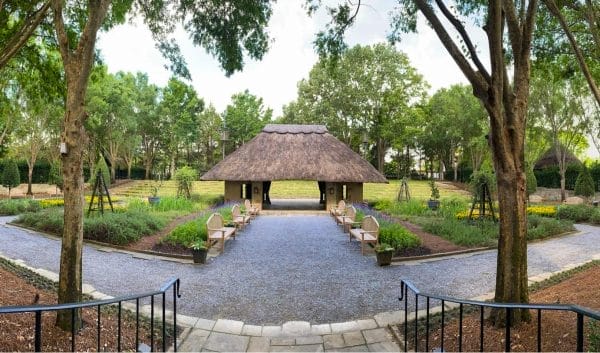 Shakespeare Garden
In the early 1980s, Blount became involved with the Alabama Shakespeare Festival (ASF) at the urging of his second wife, Carolyn Varner Blount, whom he married in 1981. ASF began as a summer theater group in Anniston and had achieved renown, but rapid success had left the organization deeply in debt. Blount paid its debts and spent $22 million to build a theater for it in Montgomery—at the time the largest donation ever made to an American theater company. ASF is today the sixth biggest Shakespeare festival in the world, attracting more than 300,000 visitors annually. He donated another $20 million to create the 300-acre Wynton M. Blount Cultural Park, which contains ASF, the Montgomery Museum of Fine Arts, and other cultural attractions. (Blount used the original spelling of his name in his philanthropic work.)
Shakespeare Garden
In the early 1980s, Blount became involved with the Alabama Shakespeare Festival (ASF) at the urging of his second wife, Carolyn Varner Blount, whom he married in 1981. ASF began as a summer theater group in Anniston and had achieved renown, but rapid success had left the organization deeply in debt. Blount paid its debts and spent $22 million to build a theater for it in Montgomery—at the time the largest donation ever made to an American theater company. ASF is today the sixth biggest Shakespeare festival in the world, attracting more than 300,000 visitors annually. He donated another $20 million to create the 300-acre Wynton M. Blount Cultural Park, which contains ASF, the Montgomery Museum of Fine Arts, and other cultural attractions. (Blount used the original spelling of his name in his philanthropic work.)
Blount believed deeply in the value of education, even though he himself never graduated from college. He was a trustee of the University of Alabama from 1959 to 1991 and donated millions of dollars not only to that university but also to Huntingdon College in Montgomery and Rhodes College in Memphis, Tennessee. In 1992, he was a founder of Montgomery Success by Six, which supports preschool education.
In 1999, Blount sold his company to Lehman Brothers and retired from business, but he remained active in cultural and educational organizations such as ASF and Rhodes College. He died in 2002 at his summer home in Highlands, North Carolina. His wife, Carolyn, died three years later. They are buried in a private chapel near the ASF theater. Two research chairs at the National Postal Museum and the Winton M. Blount Chair in Social Sciences at Rhodes University were endowed by his estate. In 2008, Blount’s children donated his 19-room home in Montgomery and 103 acres of land around it to the state of Alabama, which is using it initially to entertain dignitaries and may one day use it as a governor’s mansion. The land is adjacent to the Winton M. Blount Cultural Park. Blount’s oldest son, Winton M. Blount III, is active in the Alabama Republican Party and ran for governor in 1994 and 1998.
Further Reading
- Blount, Winton M. with Richard Blodgett. Doing It My Way. Lyme, Conn.: Greenwich Publishing Group, 1996.
